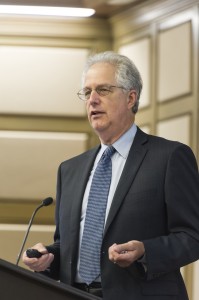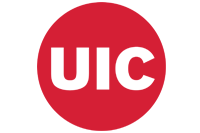
Attorney Thomas Leavens addressed issues of fair use at The John Marshall Law School’s “Hot Topics in Intellectual Property” series. His discussion focused on the Court of Appeals decision in Cariou v Prince.
An Aug. 28, 2013, discussion of a recent court decision on fair use was the first in the new “Hot Topics in Intellectual Property” lecture series initiated by the Center for Intellectual Property Law.
Thomas Leavens, a partner at Leavens, Strand, Glover & Adler, LLC, led the discussion for “Fair Use Post Cariou: Are the Rich and Famous Entitled to Broader Fair Use Privileges?” He focused on a Second Circuit Court of Appeals decision Cariou v. Prince that was issued in April 2013. The case focused on the application of the fair use doctrine under copyright in connection with “appropriation art.”
Leavens practices entertainment and media law in Chicago, and represents a wide range of music, television, film and publishing clients. He also has served as general counsel for a publicly traded record company, a digital music company and a media production and brand development company.
Leavens outlined the decision in Cariou v. Prince that raises significant questions about the application of the “transformative” use test to a wide variety of copyrighted works and how it has the potential to alter fair use analysis in significant ways. Leavens led a spirited and sometimes contentious discussion on application of the court’s new tests for “transformation.”
Contending that the court was incorporating the reputational and market analysis of trademarks into a copyright matter, Leavens suggested that this new test may be applied to other copyrighted works, including music. He noted that the court’s “name checking” and market analysis appeared to give more weight to the work of Prince, the famed performer and defendant in the case, than to traditional transformation analysis.
“I agreed that Cariou sets an unfortunate precedent that might grant successful artists, singers, film directors and even novelists a broader fair use right than their less well-known colleagues,” said Professor Doris Estelle Long, director of the Center for Intellectual Property Law. “The session was extremely well attended with over 40 practitioners, professors and students in attendance. “
Future presentations in the “Hot Topics in Intellectual Property Law” are designed to present breaking news, current event IP topics throughout the school year.

